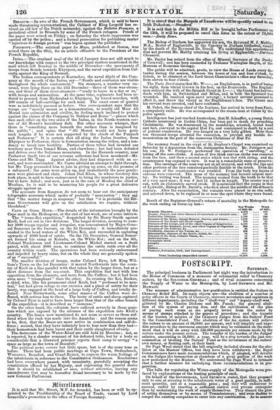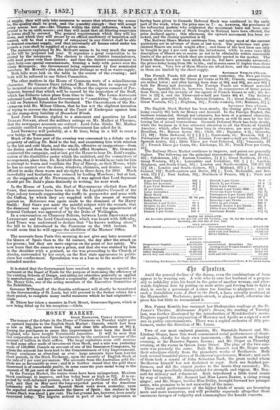POSTSCRIPT.
SATURDAY.
The principal business in Parliament last night was the introduction in the House of Commons of a measure of substantial relief to Chancery suitors, by the Soutaion-Gnsmitsi. ; and of rival measures concerning the Supply of Water to the Metropolis, by Lord SEYMOUR and Mr. MOWATT.
The measure of administrative law-purification is entitled the Suitors in Chancery Belief Bill. Its main objects are—the abolition of a number of petty officers in the Courts of Chancery,.sinecure secretaries and registrars in different departments, including the chaff-wax" and " deputy-chaff-wax" gibbeted by Mr. Charles Dickens and Mr. Punch ; the general aboli- tion of the system of paying fees, and the substitution of the plan of paying such sums as are properly levied from the suitor by means of stamps attached to the papers of procedure ; and the transfer of the burden of salaries of the Chancery Judges from the Suitors' Fund to the Consolidated Fund. The abolition of the fee system will relieve the suitors to an amount of 60,000/. per annum, and will simplify and expe- dite procedure to the enormous amount which may be estimated on the state- ment that it will do away with 330,000 payments per annum made by the suitors under the present system. The transfer of the burden of the Judges salaries, amounting to 28,0001. a year, will be a step towards the just con- summation of treating the Suitors' Fluid as the investment of the suitors' own money, or floating cash, at their bank.
Sir Page Wood stated that the bill originally included clauses for the abo- lition of the Masters' Offices, but they have been withdrawn : the Royal Commissioners have made recommendations which, if adopted, will devolve on the Judges the transaction at chambers of a great portion of the work now performed by the Masters. We understand Sir Page Wood to intimate that a further measure for embodying those recommendations is in pre- paration.
The bills for regulating the Water-supply of the Metropolis were pre- faced by explanations of the leading principle of each.
On behalf of the Government, Lord SEYMOUR stated, that they proposed only to aim at securing to the inhabitants water of a good quality, in suffi- cient quantity, and at a reasonable price ; and they will endeavour to succeed, rather by enacting a sufficient control over private enterprise than by undertaking the work of supply themselves. They discard the plan of acting themselves or by means of Commissioners ; and even decline to compel the existing companies to enter into any combination. As to sources of supply, they will only take measures to secure that whatever the source be, the quality shall be good, and the quantity enough : they will accept every source but one—the Thames within the tidal influence, which is proved to be an unfit source ; and they will insist that all filtering-reservoirs in towns shall be covered. The general requirements which they will lay down, and which they will secure by an official machinery of inspection and control, will be that a majority of ratepayers' in any district shall be able to demand constant supply, and that universally all houses rated under ten pounds a year shall be supplied at a given rate.
The measure explained by Mr. MowArr seems to be very much the same as the bill he proposed last year. It organizes a great corporation to be elected by the ratepayers. The electors to choose district commissioners, with local power over their district; and then the district commissioners to elect forty-one special commissioners, forming a body with power over the whole Metropolis; the Government being represented by four nominated members. Mr. Mowatt's plan also includes drainage as well as water-supply.
Both bills were laid on the table in the course of the evening ; and both will be referred to one Select Committee.
The other matters in the House of Commons were of a miscellaneous character. Sir GEORGE GREY informed Mr. Hume, that no expense will be incurred on account of the Militia, without the express consent of Par- liament, beyond that which will be caused by the inspection of the Staff, which has hitherto taken place from time to time. The LORD-ADVOCATE informed Lord Melgund, that Government is "considering" the subject of a bill on National Education for Scotland. The CHANCELLOR of the Ex- CHEQUER told Mr. Milner Gibson, that he has not the slightest intention of trying to reverse the decision of the Court of Exchequer against him on the stamp-duty liability of Household Words.
Lord Josue Bulimia. replied to a statement and questions by Lord DUDLEY STUART, about the military outrage on Mr. Mather at Florence, that the newspaper accounts are correct : Lord John thinks Mr. Mather certainly entitled to reparation, and Government has asked for it.
Lord SEYMOUR will probably, at a fit time, bring in a bill to erect a new bridge at Westminster.
Much of the later part of the evening was consumed in a debate on the propriety of calling Dr. Reid to the bar, and examining him with relation to the hot and cold blasts, and the smells, offensive or inopportune—from the drains and from the kitchen—which afflict Members. Mr. OSBORNE conducted the campaign, and at last got the House to hear Dr. Iteld's expla- nation of the disabilities under which, the architect, and the committees of management, place him. Dr. Beid told them, that it would bees vain for him to attempt to warm and ventilate the Bay of Biscay, as their House, while he has no control over the doors, windows, chimnies, and drains ; and he offered to make them warm and air-tight in three days, for 3001. Much incredulity and hesitation was evinced by leading Members ; but at last, on the suggestion of Mr. NEWDEGATE, it was agreed that Lord Seymour should get Dr. Reid's plans distinctly in writing, for next week.
In the House of Lords, the Earl of Maramantrixv elicited from Earl Cm; that measures have been taken by the Legislative Council of the Cape colony towards suppressing the traffic in gunpowder and arms with the Caffres, by which they are supplied with the means of warring against us. Reference was again made to the dismissal of Sir Harry Smith : Earl GREY put aside the painful subject with the remark, that the dismissal was approved of by the Cabinet, and the appointment of General Cathcart was approved of by the Duke of Wellington. In a. conversation on Chancery Beform, between Lords BROUGHAM and LYNDHURST and the Lord thsewention, which was heard with difficulty, Lord Truro was understood to declare that "he knows nothing about" the bill to be introduced in the Commons on the 16th instant. It would seem that he will oppose the abolition of the Masters' Office.



























 Previous page
Previous page